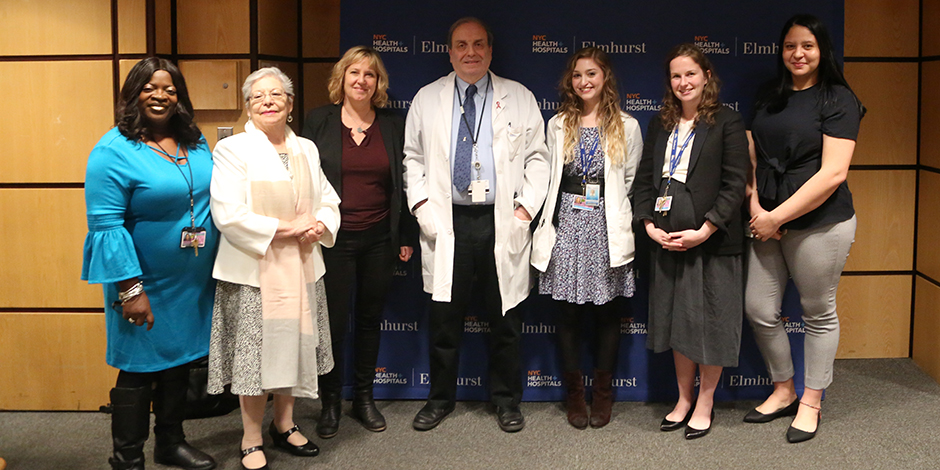NYC Health + Hospitals/Elmhurst Advances Discussion of the Impact of Climate Change on Public Health
Expert Presentations Focused on Climate Change's Impact on Vulnerable Populations and Steps to Reduce the Carbon Footprint
Apr 27, 2018

The Global Health Institute at NYC Health + Hospital/Elmhurst hosted the program “Earth’s Vital Statistics: How Climate Change Is Affecting Your Health,” featuring local and international experts. Coinciding with Earth Day, the presentations focused on climate change and its impact on public health around the world.
“NYC Health + Hospitals/Elmhurst is proud to celebrate Earth Day by bringing attention to the important issue of climate change and how it is affecting our health,” said Israel Rocha, Jr., chief executive officer, NYC Health + Hospitals/ Elmhurst. “At NYC Health + Hospitals/Elmhurst, we have taken several significant steps to reduce the carbon footprint, such as using energy-saving lighting and fixtures, reducing the number of physical servers needed to run hospital computers, installing energy efficient boilers, and using green-certified cleaning products. We are continuing to plan for a greener future in order to protect the health of our patients, staff, and community.”
“The impact of climate change is getter clearer, and more frightening, every year,” said Joseph R. Masci, MD, executive director and founding chair of the Global Health Institute at NYC Health + Hospitals/Elmhurst. “It is important for those of us in the medical profession to understand what we are facing, and Earth Day is an excellent opportunity to educate ourselves and our patients. We hope attendees are not only up-to-date on the science, but also walked away understanding practical steps we all can take to respond to the challenge of global warming.”Dr. Masci, a well-known expert on infectious diseases, discussed possible links between climate change and outbreaks of vector-borne diseases that were once rare, such as Ebola and Zika, as well as food-borne illnesses, such as salmonella and E. coli.
Jennifer Cherrier, Ph.D., oceanographer and chair of the Department of Earth and Environmental Sciences at Brooklyn College, discussed how increased global average temperatures of two to four degrees are having a dramatic effect on sea levels and causing extreme weather patterns that are altering living conditions for the world’s most vulnerable populations.
Chadia Wannous, Ph.D., network coordinator, Towards a Safer World, an initiative of the United Nations, presented on how land use changes, such as urban sprawl and deforestation, are drivers of emerging infectious disease trends.
Jennifer Reese, MD, chief resident, Department of Medicine, NYC Health + Hospitals/Elmhurst and Nadia Solomon, MA, MSc, medical student at St. George’s University, presented information on practical steps individuals can take each day to mitigate the effects of climate change.
Liz Noeul, student from Brooklyn College, discussed the impact of climate change on nutrition and food security.
Attended by a crowd of more than 120, including members of the neighboring community concerned about climate change, the program also offered practical tips and changes that people can incorporate into their everyday lives to minimize their impact. Tips included unplugging appliances when not in use, and using tote or biodegradable paper bags when purchasing groceries to reduce waste from plastic products.
For more information about the Global Health Institute at NYC Health + Hospitals/Elmhurst, please visit www.nychealthandhospitals.org/elmhurst/globalhealthinstitute/ or call 718-334-1259.